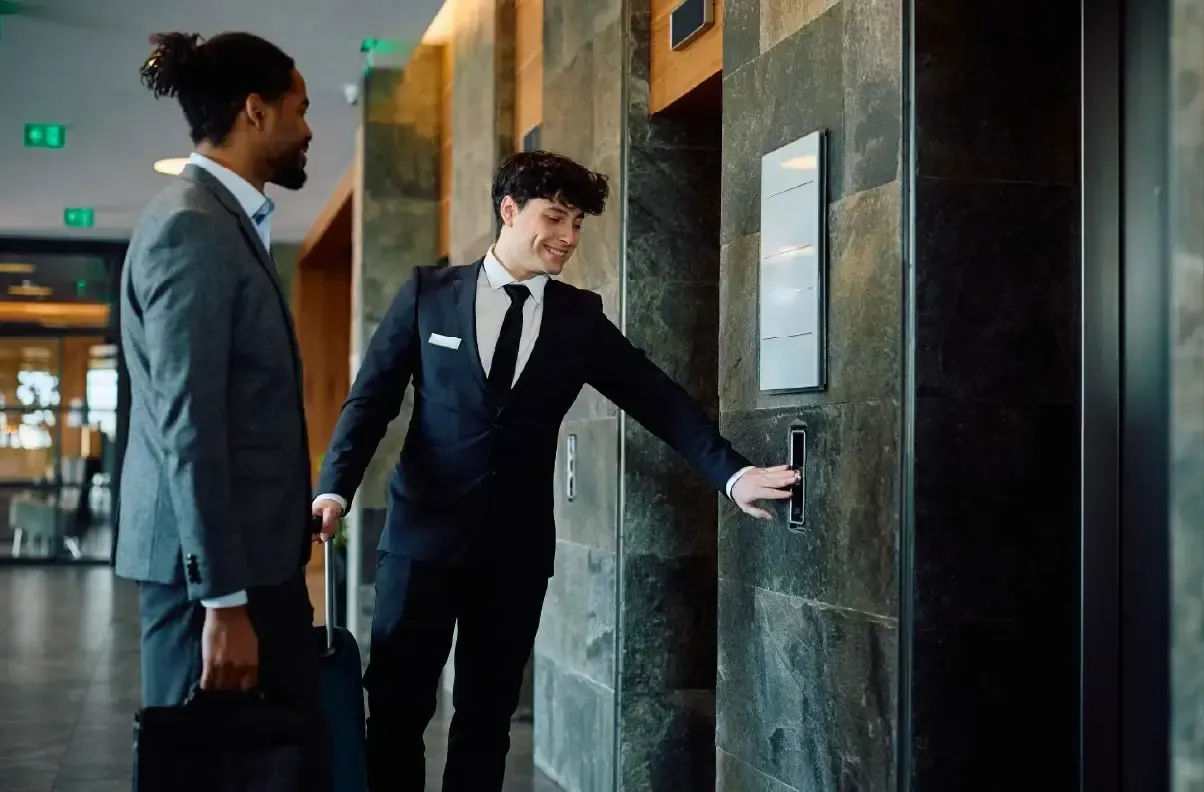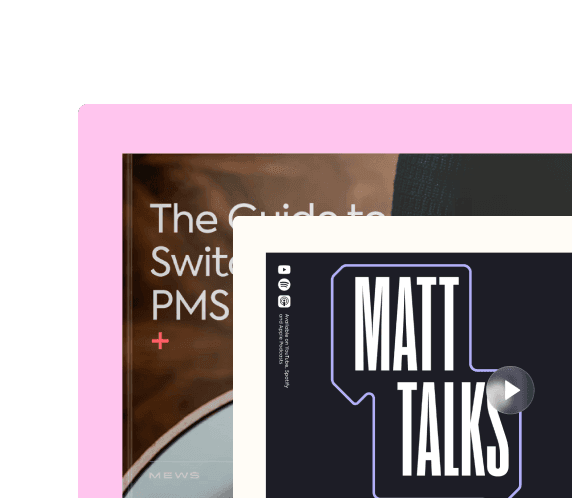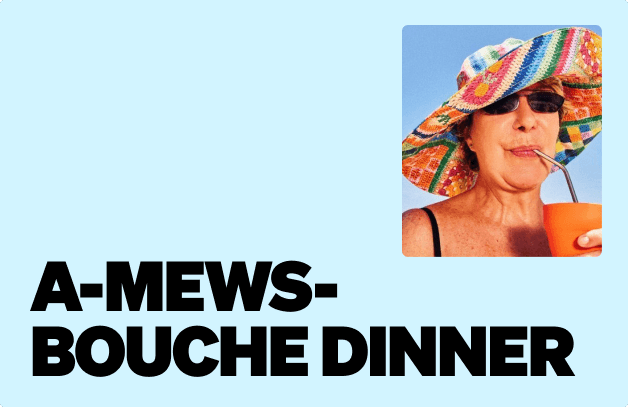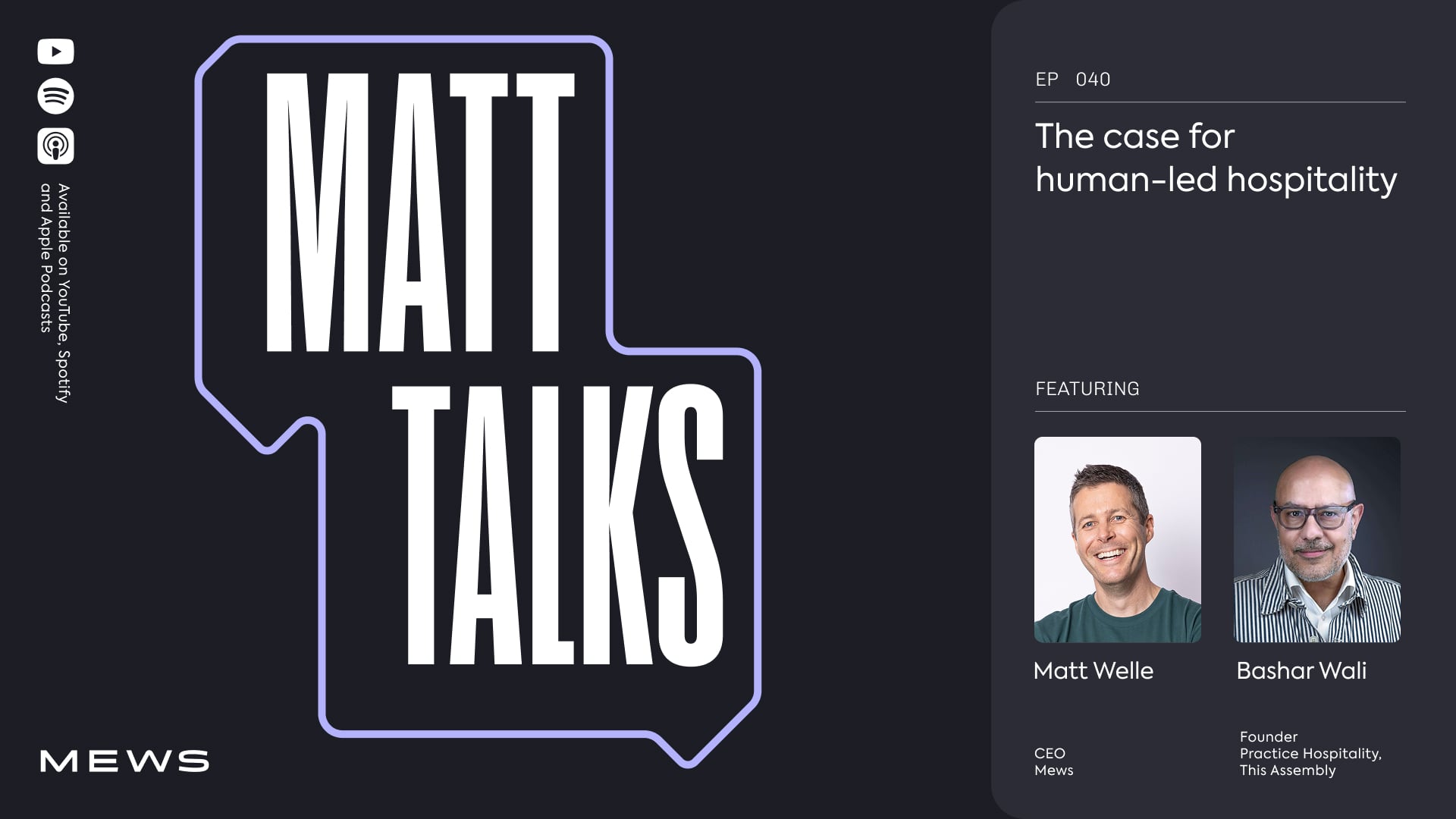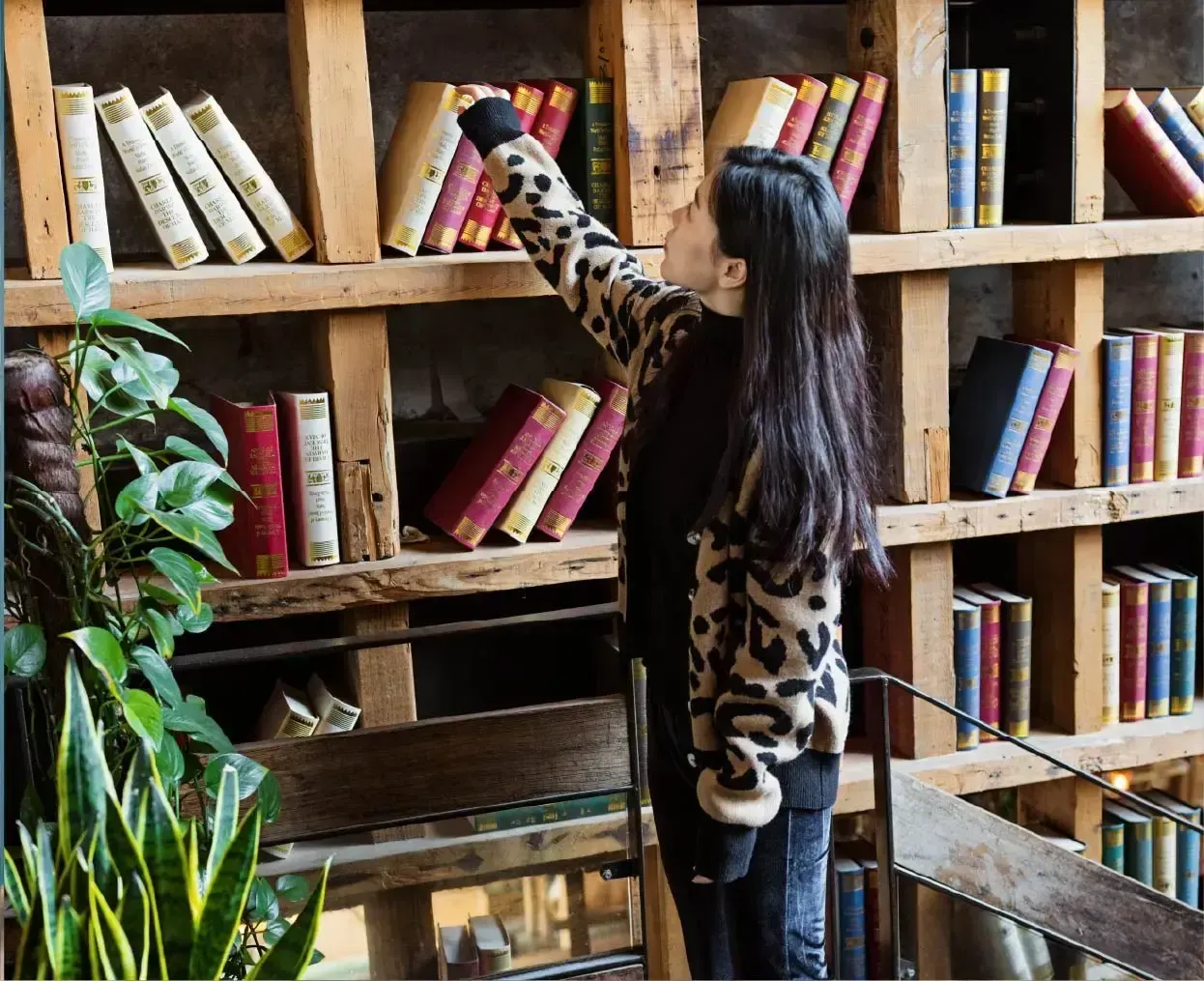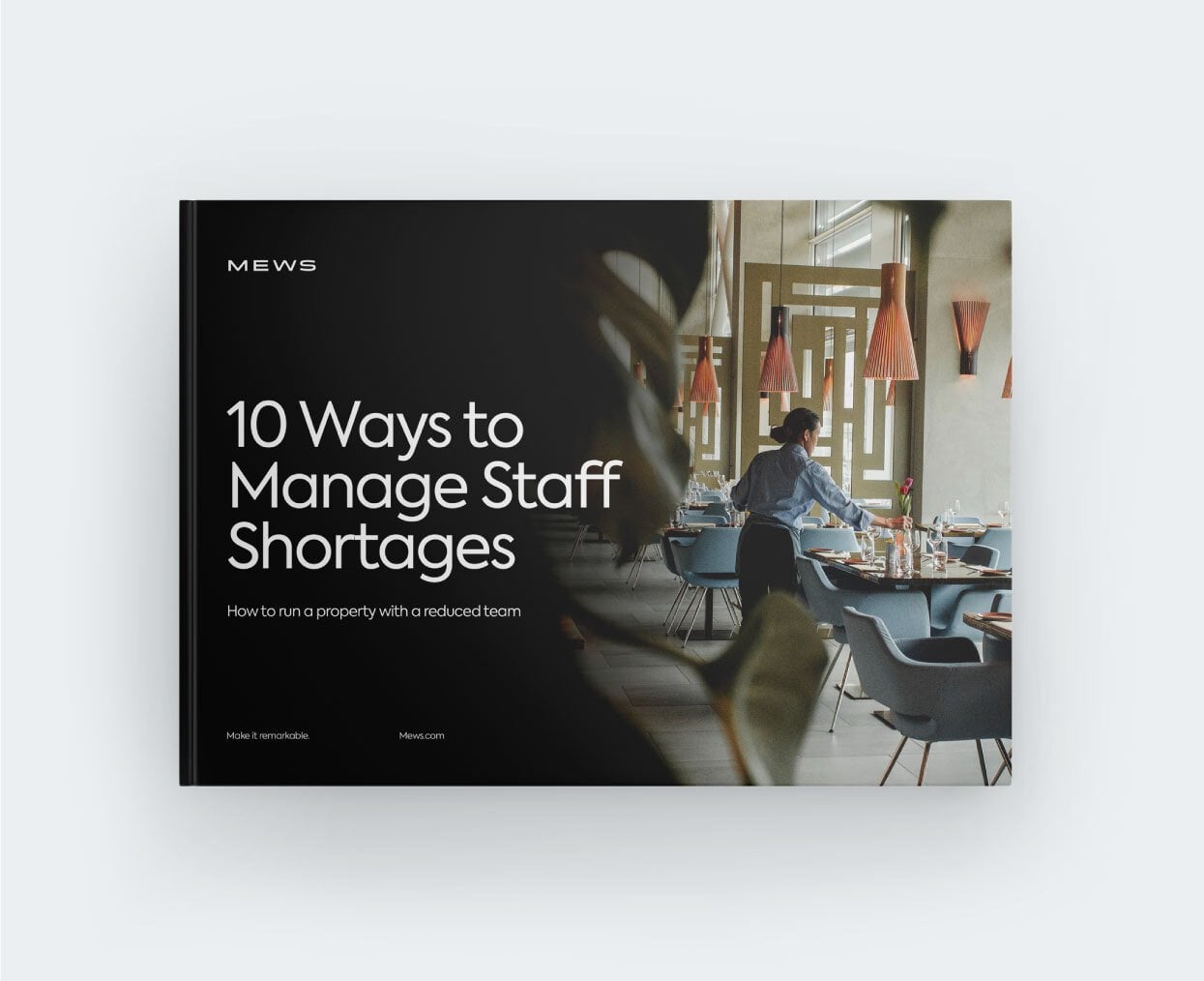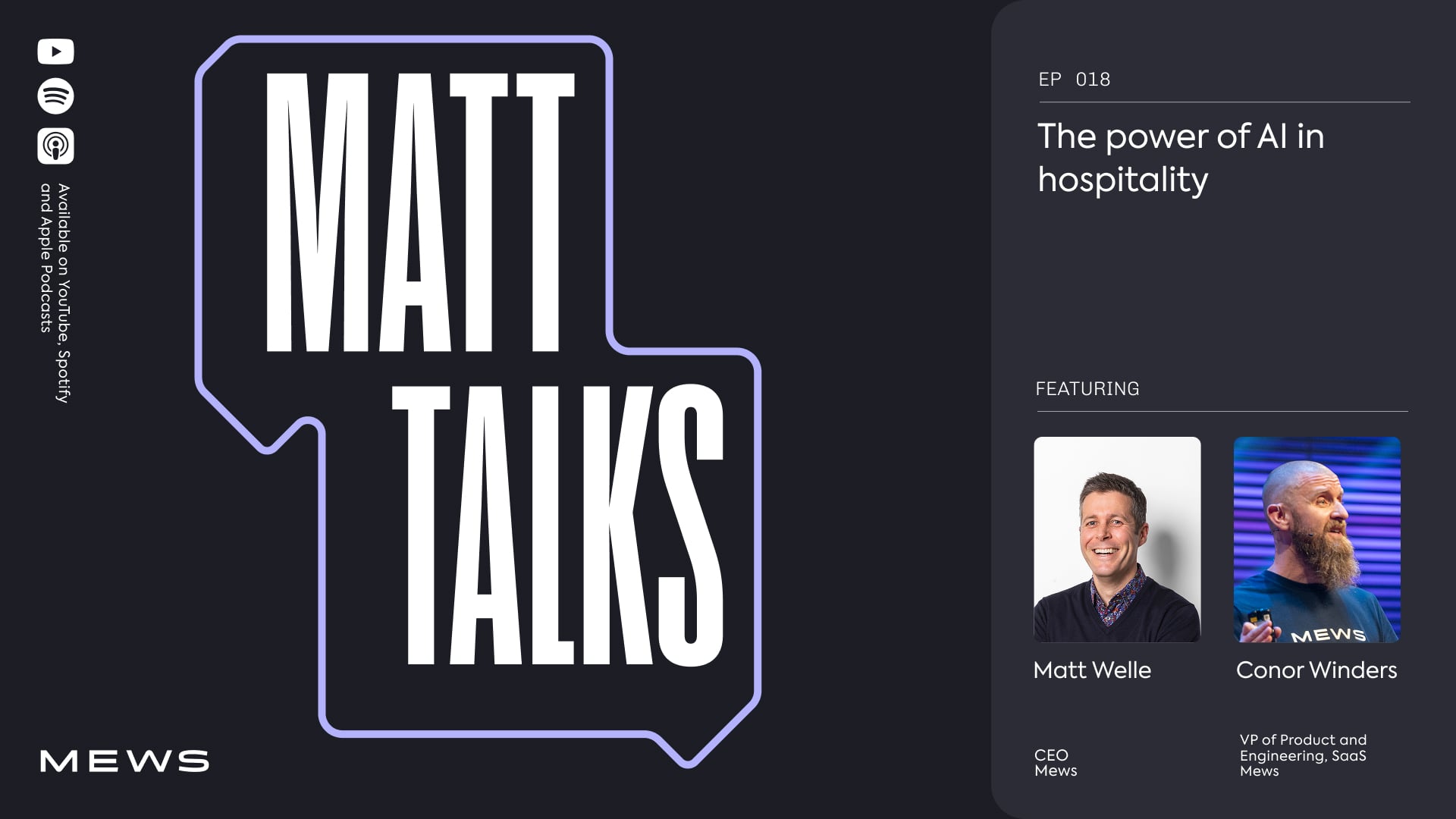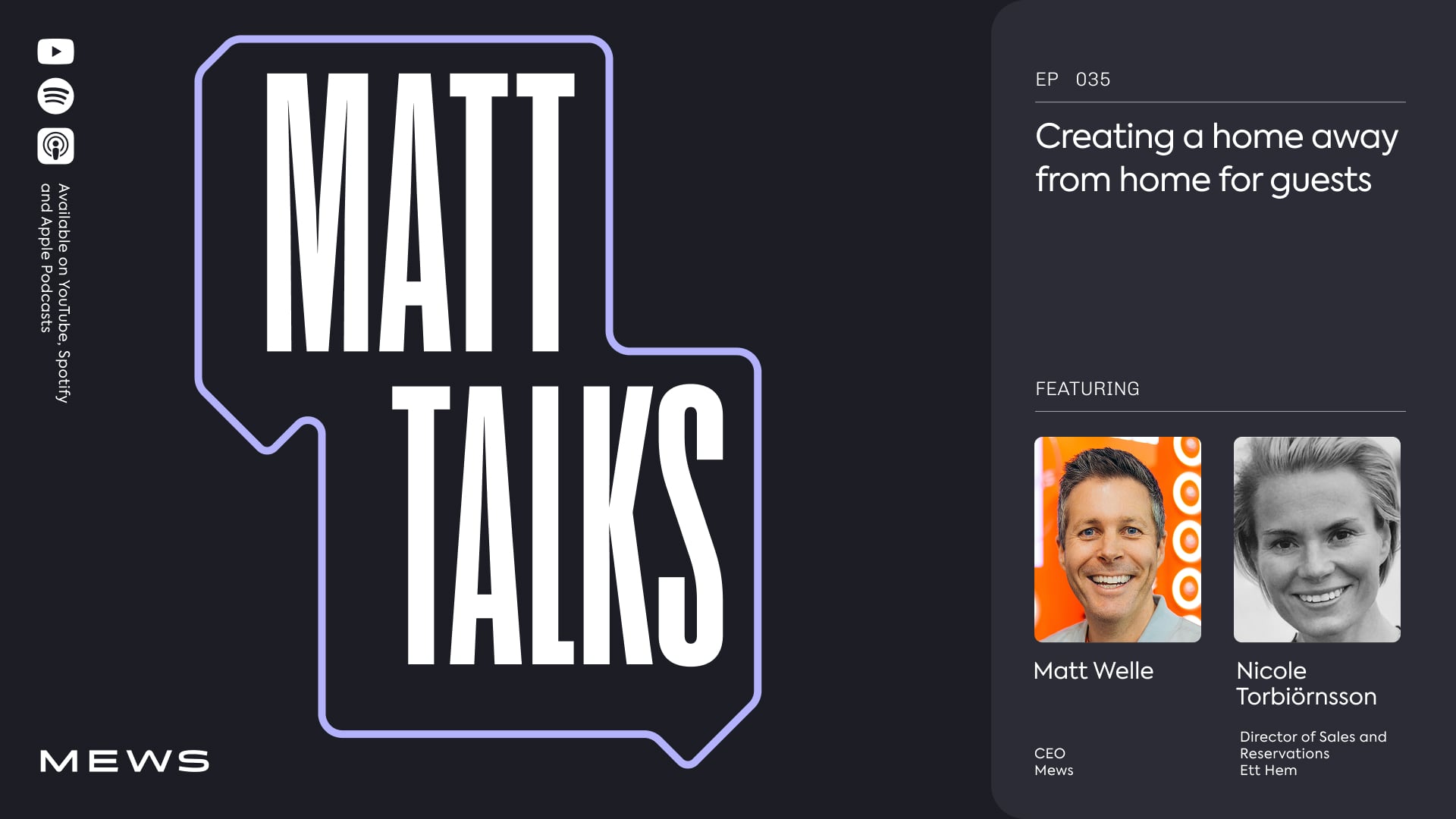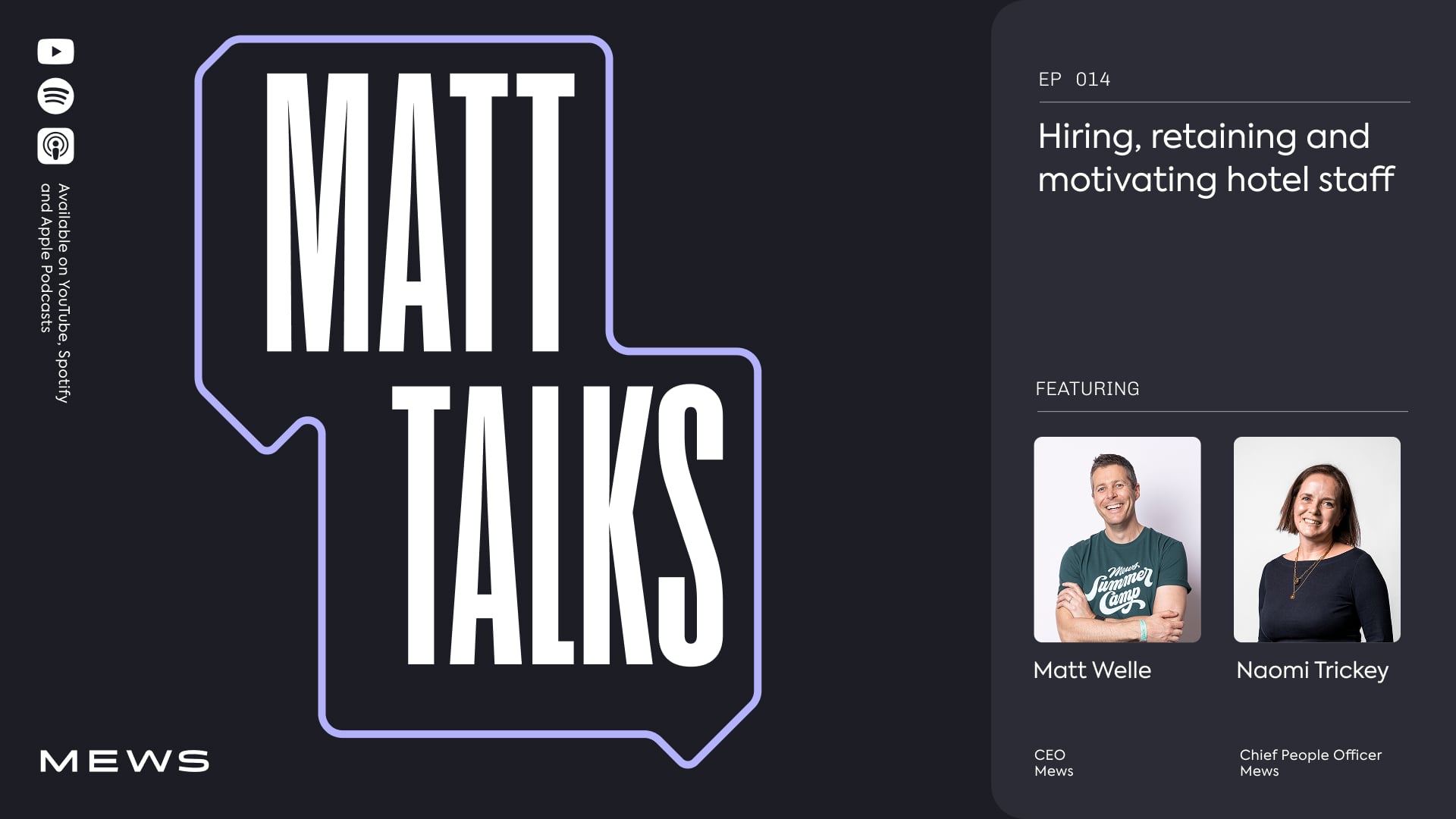What to expect?
Meet your speakers

Matthijs Welle
CEO, Mews
After years in the trenches of hospitality, Matt joined the Mews journey during its early days in 2013. Since then, he’s been our fearless CEO, leading the company and the industry forward.

Bashar Wali
Founder of Practice Hospitality and This Assembly
Bashar has built and scaled multiple hospitality ventures across the US, from boutique hotels to consulting. He has trademarked the phrase "longing for belonging" in hospitality.
Episode chapters
Transcript
Introduction
Hi, everyone. Welcome back to another Matt Talk. And this week, I have a very special guest who matches my energy and then some. Bashar is joining me and he has way more experience in hotels than I have. I think I was counting it on LinkedIn. I think it's more than 23 years actually working in a hotel specifically.
And now you're helping hoteliers strategize. But I think you'll do a much better job at introducing yourself. So I'll let you do that.
I'd be happy to. Thanks for having me, by the way. I know this is going to be fun. It's bright and sunny out.
So here we go. So I really, it's hard for me to talk about myself because I truly, truly believe that my industry is exceedingly simple. And although I did go to hotel school, you don't need to go to hotel school to do what we do. So I'll open by saying, I grew up in the Middle East, and often people ask me why I got into this business.
And I'll often stand on stage, by the way, and tell people who went to Cornell, I did not go to Cornell. I was not smart enough nor rich enough to go. But I say, guys, I'm gonna spare you a lot of time, effort, and money. I am about to give you a PhD in hospitality on this stage.
Here we go. So the quote we have where I grew up goes, when a stranger shows up at your door, feed him for three days before you ask him who he is, where he's from, or where he's going to. Because by then, he will either have the strength to answer or you will be such good friends, it won't matter. And I sort of drop the mic and I say, what more do you wanna know?
When someone shows up at your hotel, be nice to them, giving them what they want, how they want it at the time that they want it equals success. End of story. And people get so caught up into what we do and it's become more scientific and frankly, and no plug to you, I'm not getting paid to plug you, but thanks to you guys and what you do, you've sort of taken care of all the other science-like stuff. So we don't need to because we're now allowed to spend our time and energy focusing on the emotional part of what we do, which in my opinion, is 95 percent of what we do is that emotional part.
So I tell people, I'm a hotel guy. I went to school for it. I worked from the ground up, literally cleaning toilets, making beds, frying eggs, like doing it for work, not just in a management training program showing up for a day. And I've negotiated 500 million dollar deals against big lenders.
So I love the fact that the street education, the hands-on education has given me such a broad spectrum because I believe to be a truly good leader. If I show up to you and say, you're making the bed wrong, I don't want to tell you you're making the bed wrong. You've been doing it for 20 years because I studied it somewhere. I want to tell you you're doing it wrong because I've actually done it.
Chapter
What really drives successful hotels
And I truly believe it gains you respect from those that you work with when they say, oh, yeah, this person actually has been in the trenches. So what I do today is I have this company called This Assembly, and my goal within it was to sort of be a one stop shop for hoteliers, aspiring hoteliers. So I sort of say from cradle to grave, anything hotel, anything in the middle. I do not wanna do everything.
I wanna do the things that I believe we can add value in. And generally speaking, the things I believe we can add value in are the nebulous, the intangible, the emotional. We call it alchemy. I cannot give you the formula to alchemy.
Alchemy is a state of mind. You can give me a gorgeous building, and I will tell you this building has no personality. Let me help you infuse personality in it. And similarly, you can give me a very challenged, physically challenged building, and I could do exactly the same because our industry isn't about the building.
It truly is about the emotion and the soul, which is the least considered part because my industry has gone towards shock and awe and design and branding and music consent because we think that's what matters. And don't get me wrong. All those things matter without I mean, think about this. We'll do this analogy.
You can create the most physically perfect human, physically perfect in every way, but if they don't have a soul, it doesn't matter.
If you inherit a building that is really not very pretty, which is many hotels around the world, how do you inject personality into that?
I travel like crazy. And wherever I go, if I'm in Amsterdam for three nights, I will never stay at the same hotel twice. I will move three times to sort of learn and see and watch and understand. And I've kept track in New York City.
Right? I've kept track everywhere, but New York City, I've actually kept count. I've stayed in 259 hotels in Manhattan. And people will often say, what do you remember?
What stands out? And I'll say, ask me what kind of flooring material is at the bathroom at the Baccarat. I don't know. All I can tell you is it was nice.
Ask me what kind of art is on the wall at the Peninsula. I don't know. I can tell you it was fancy. What I bring home with me and how do you make a hotel memorable and how you infuse it with soul is by creating an environment where humans care for other humans, make them feel warm and welcome.
And it's very innate to us humans. It's our DNA. I talk a lot about this idea of we're tribal animals. We need each other to survive and it's still in our DNA.
Chapter
The concept of belonging in hospitality
I've actually trademarked the term longing for belonging in hospitality. So I think I succeed, aka infuse soul in a hotel, if I make you feel that when you've arrived, you belong. These are my people. This is my tribe.
This is my place. Now, again, don't get me wrong. Of course, the bed has to be the best bed. Of course, the WiFi has to be the best WiFi.
All those things are what once was aspirational has become table stakes. Like, you don't get credit for having good WiFi. God help you if you don't have good WiFi.
Can I play devil's advocate against.
Push against please.
I would probably say. I would say this like, I can barely staff the hotel. It is such a struggle to hire good people to want to work these shifts and these jobs. So how do I get them to the next step to actually deeply care to create those experiences?
Let's say you and I have two hotels next door to each other. They're identical in every way. Quality, design, art, blah, blah, blah. We have to pay the same, you and I.
Right? Because it's a market driven thing. I can't pay half of what you pay or double what you pay. It just doesn't work.
Our benefits have to be largely the same. People are going to like our hotels equally. What kind of environment have you created to make the employee more attracted to me? My neighborhood and my city and my community and my planet and the world and on and on and on. It's a lot of intangibles that don't happen overnight and aren't checklist driven.
You have to establish this sort of aura about your company that people actually seek it out and wanna work for you. And the idea again is in a very tight labor market, and I am not underestimating the complexity of this. It is exceedingly complex. And again, what I talk about people often think is what I'm doing.
I'm saying, this is also my aspirations for my hotels. But at the end of the day, I really truly believe that people, of course they want a good paycheck and benefits, but they also want to feel that they're cared for. I'll give you an example. Imagine you work for me and I say, listen, the public bathroom better be spotless.
Chapter
Taking care of hotel staff
I better be able to eat off the floor. But you go to the employee bathroom and it's a war zone. Nothing works. It's broken.
It's filthy. What kind of message am I sending to you by doing that? Not to give Marriott any credit, but I will for a minute. One of my favorite quotes in the industry from Marriott, original Marriott goes, Take care of your people who will take care of your guests, who will in turn take care of you.
So it really is that simple, but we live in a world that's super transactional and we've come to accept the transactional nature, even with a guest and now with an employee. I think the way I attract you and keep you and make you motivated to work harder and stay is by saying you matter. You individually matter to me. I care about your life and your kids and your hopes and your dreams.
Very hard to do.
But we've also in the United States at least come to think of HR as lawsuit prevention teams, when in fact that is the last job they should be doing. Their job is to take care of the employees, which de facto prevents losses.
I love that. So out of those 250 hotels in New York you've visited?
259 to date. Yeah.
What is your favorite one and what makes it so unique?
Again, and and we'll touch on that too. So when generically someone who wants to ask what's my favorite, I really love Crosby Street Hotel. I'm sure everyone knows it. It's been around forever.
It's part of Firmdale Hotels, the British company. Kit Kemp does impeccable work. You may disagree with her style and sense of design, but their work is impeccable. So that's my favorite hotel.
What hotel stands out the most? I'll tell you the story that I tell often. At the Refinery Hotel in the Garment District run by Highgate, I go up to the rooftop. I walk up to the bartender, and I ask for a Fernet Branca.
And usually, bartenders give you street cred when you order Fernet because it's like an insider's kind of thing. Got it. Guy disappears. Like, five minutes goes by.
I can't see him and there's no drink. Like, where is this dude? Ten minutes goes by. I see him running through the bar with a bottle.
I say, hey, what's happened? Do you have to go to the storeroom to go in? He said, no. We were out.
So I ran down the street to buy one. Literally, that's as simple as it is. Because what that guy is telling me, if you agree with Maslow's hierarchy of need, right? At the very bottom of Maslow's hierarchy of need, for those who don't know, the scientists who studied humans and what we need and sort of our needs to survive, at the very bottom are physiological needs.
We need oxygen, we need water, we need food, we need shelter. Hotels are at the very bottom of Maslow's hierarchy of need. We provide shelter. At the very top of that pyramid, when we have arrived and we are thriving now as humans, we don't need all that stuff.
That's table stakes, like we said, the WiFi and all of that. You have to have it to be in business. At the very top is transcendence, self actualization and transcendence. Being upgraded to a suite because someone thought I was a VIP, that's not transcendence because that's again, very transactional.
Somebody printed a list that said he's a VIP, but that guy running down the street to buy this for me says to me, I see you. You're somebody, you matter. That act presses that transcendence button so many times for me that my heart lights up and I'm now yours for life. So we've forgotten this notion and this idea that we all want to be treated like individuals.
Even by the way, in the corporate context, say, I tell a team, hey team, good job. Yeah. Fine. The team did a good job.
Got it. But what about you individually? How do I acknowledge your contribution? So it really is simple and very, very sort of basic to us as humans.
And I take the analogy and use it on the building as well, like to our earlier comment. Yeah.
Of course. But how do you push that button? For the time being, that button is exclusive in my opinion.
I won't say humans. I'll say mammals. Because if I have a really cute dog in the lobby that came up to you and played with you and knocked on the door, it's the same serotonin that you're gonna get, that same emotion you're gonna get. Maybe you can have, I don't know,
maybe you can have a little pond with a dolphin in it, same idea, or a whale for that matter. It's mostly exclusive to mammals, and I think that delivers that feeling. Until we can teach robots emotional intelligence and empathy, it's exclusive to us. And that's the last thing we seem to focus on because we want to out-art the guy and out-design the guy and all that stuff.
Chapter
Why human connections still matter
And we figured the very core of what we're doing, which is the human connection.
And if you look at the way that hotel industry is structured, you've got the brands, you've got the management company, you've got the ownership company. And in the U. S. They are very separated.
So the owner might not always want to invest into the hardware. So as a management company, you don't maybe have the baseline, but you might get the service right because that's what you do as a management company. So if you get the service right, the baseline is off, how do you deal with that as a hotelier? How do you battle that challenge?
Clearly, often face those challenges. I still submit to you that if you get the human part right, the person, the people part right, all of the other things you can mitigate. But I can have the most efficient, the most beautiful, the most, the most, the most, the most. And if I am not warm and friendly to you during your stay, it's going to negatively affect your stay and everything else falls apart.
Like, you know, when you go to a restaurant and you have an amazing waiter or waitress, the food becomes better because of their behavior. But you can have amazing food with a terrible waiter and and the experience is sort of flawed now. So it it really is a delicate delicate balance, but you have to find a way to mitigate the inefficiency that you may lack because of the archaic nature of system, lack of availability of systems and processes. Like, if my room is small, but the service is amazing, it's a better experience than if the room is palatial with terrible service.
So again, I am oversimplifying, obviously.
The way I book holiday, I'd rather be in a small room in a wonderful luxury hotel than the biggest suites in a kind of crappy hotel because I know that everything else is going be really great. And I do look at that. Yeah.
Totally agree. And again, since the pandemic, we've hung our hat on this idea of automation, but we were excited about it in a tight labor market, in a no contact world during the pandemic and a very tightening margins. So we're all of us hoteliers are like, score, no more people. And I think we're thinking about it the wrong way.
And I use the example of airlines. Like back in the day, you would walk up to the counter and there'd be thirty people for one airline trying to check people in. Now there's one, maybe two, because everything has been automated. The difference between airlines and us is the airlines still have you captive on that tube in the sky where they can actually connect with you and provide you a reason to be loyal to them beyond you're the convenient airline on this route.
I have stayed in hotels, mostly branded, where I literally never engaged with another human. I walk in straight to the elevator. I go up to my room. I do my business.
I go out and I leave. You have missed an opportunity on captivating me because what you gave me in that example is a commodity. And if we think of ourselves as commodity, now we're at the bottom of Maslow's hierarchy of need. And I use the example of petrol gas.
If I want gas for my car, I don't care what it is, what the logo says, what the tagline is. I don't care about any of those things. I care about two things, price and location. And if that's what we end up thinking of ourselves that in a very impersonal cold experience, then the only reason you're gonna pick me is because of my price on my location.
So if my location is not good, now I have to discount my price meaningfully versus you know what we do, you and I. I'll go to Amsterdam and someone will say, oh my there's this amazing restaurant that you have to take an Uber for forty minutes to go to it. I'll do it. Like, we are willing to go out of our way for a great experience.
I'm not willing to drive forty minutes because the gas station logo is nice. That doesn't make any sense. So that's really the piece that we're missing is that this idea that without this connection, we are a commodity. We are at the very bottom.
But if you think about that experience, right now you go into the hotel and you walk in and you look for a desk and then you queue up and then you get ignored for a while. And so that is the moment of connection. That should be the moment of connection, hypothetically. So I'd rather use the digital key to get into the hotel. So how do you create a moment of connection that isn't passport credit card, registration card, all of that, but do something different?
The way you do it, back to my idea of relying on technology like we did during the pandemic, I often preach the gospel of, let us use technology to allow us to remove friction, remove friction, to then enable less people working for us that we now can pay more because we have less of them. We can choose better people to allow them to say, I don't need anything from you. Here's your key because I already have your credit card. I show up in a hotel.
I have my license and my credit card in my hand and my arm is extended literally like Superman. And I'm spelling my four letter last name for you. And what do I get? Someone is looking down, punching keys on the keyboard.
They look up at me, they ignore me, they punch them down again.
And I'm thinking when I give them my name to Check me in, I'm like, What are you punching? I know how to use PMSs. My last name is four letters. How are you making ninety two keystrokes?
I don't understand. So we haven't trained our people enough. Well, first of all, the technology is archaic, right? We are still dinosaurs in hotels and I don't understand why we are so late adopters.
I mean, I understand why the capital cost, it was these big systems are required hardware and all that, but all of that is changing and shifting. So if you manage to use technology to remove the friction, I'll give you another very frustrating example. I'm on a booking engine by step seventy two, I am in the zip code field where you are now making me change my keyboard from alpha to numeric. So I'm going, why do you need my ZIP code a?
Why don't you change the keyboard for me b? Why don't you already have my information c? So you know what happens out of frustration? I go to Expedia.
One, two, booked. So so we haven't perfected the art of using technology to remove friction. And I know that technology exists, yours and others. It does exist to allow us.
Why can't I use Apple Pay where I can double click, use my face, and it fills everything up? And that's our problem is our reliance on technology has been based on the wrong reasons rather than the right reasons. We did it out of necessity during the pandemic, then greed to some extent. And now we're thinking, hey.
We can eliminate all humans. Terrible idea in my opinion. I think there's a beautiful balance where the technology disappears in the background and allows us the opportunity to now surprise and delight you. I hate that term.
Chapter
Bribery vs. loyalty in hospitality
We use it a lot in hospitality. You know why I want to do that? Most importantly, loyalty. We use the term loyalty so falsely in our industry.
There is no loyalty. There is bribery. You come stay in my hotel.
That stuck with me so well last time you said this.
Right. I give you points. Think about this for a minute. If I said no more points, are you coming back?
If the answer is no, that's not loyalty. I don't wanna bribe my spouse in coming home every day by paying her to come home. What a terrible way to do it. Right?
So fundamentally, this idea of loyalty is so misconceived because we've used a transaction. We've used a tangible thing in exchange for loyalty. Your loyalty to me should be because I am a good friend. I make you feel a certain way.
You like talking to me. You like hanging out with me. You don't hang out with me because of my business card or what brand I'm wearing. You hang out with me because of my personality.
And again, that's the idea is the physical plant has to be good enough. That's not what builds loyalty. It really is the personality and how you make someone feel.
That those traditional loyalty programs, your points, your status, like your upgrades, it has no place in the future or it does?
It absolutely has a place. And let's talk about it for a minute. You work for an elevator company. You're a road warrior.
You make 70 thousand dollars a year. The only way you can take your family on vacation is to suffer, go out of your way, stay at a lesser experience, further away for the points. Good for you. I do not shame you.
I do not call you out for it. That is how you are able to take your family on vacation. Although I would argue now, are you costing your company more money by going to a more expensive place for the points? Are you suffering yourself and being unproductive because you're having to go out of your way or stay in something less attractive for your soul also for that.
And if that's the case and I'm your company, you're paying for the points. Like when you stay in a hotel, the hotel owner is paying for the point. So if everyone who stays in my hotel says, I will pay you more money or less money, I don't want the points. So then my company can pay for my vacation or give me a raise.
I bet you everybody would do it. It's not really about the points. It's about the value of the points. So points absolutely have a place.
The reason I like having status on someone, some of these places is flexibility. I don't care about the points. I care about the flexibility. The Peninsula Hotel in Beverly Hills is one of the most highly regarded service hotels in the US.
It's really not that grand. Sure it's a Peninsula, but it's older, but they surveyed everyone who stays there. They said, why do you keep coming back? There's no points at the Peninsula.
And 70 percent of the correspondents said, there's no check-in and no check-out time. We are so stuck in our like who decided check-in is at noon or at three or at four, whatever it may be, checkout is eleven. If you have the room, check-in is whenever you show up, we will do our very best to accommodate you. And if we are unable to, because we love and care for you, we will say, you know what?
I'm so sorry. There isn't a room ready yet. I know you just came off the red eye into Europe. We have a spa, there's some locker rooms.
Here's the key, go to the locker room, change, we'll store your bag. Here's a coffee on the house. That's what builds loyalty, right? So fundamentally, I think the idea of loyalty, we keep thinking about it the wrong way.
People want to be treated right. And by the way, I said in my earlier comment, I remember when someone genuinely cares, not every problem can be solved. Like let's be real. People are crazy.
We can't solve all of their problems. All I have to do is pretend to care enough to convince you that I actually care. I don't even have to care. I just have to convince you that I care.
And I think that's where it's lost is this idea that we're trained to say, hi, I'm checking in. It's eleven am. I'm sorry. Checking in is at four Have you even looked that you have a room or not?
Haven't even looked.
So I was yesterday at one of our customers hotels. I go into a hotel every six months. So I went into the housekeeping team and I said, I see that your rooms are only coming back at midday.
Do they start cleaning at midday? And she's like, no, but the cleaners don't want an app. I was like, but that isn't, that shouldn't be a choice because someone's suffering on the other side of this, this wall on the front desk who has to tell people come back at three and then be lucky. It is really difficult to tell that message to a housekeeper who's like, I'm so busy. I can't think about innovation, but there's someone suffering at the front line and it's suffering in the service aspect.
I mean, I remember back in the day and I don't know today how we do it frankly, I'm not that close to it. I remember back in day when I was a housekeeper, when I finished cleaning the room, you picked up the phone and dialed it.
The technology has existed for literally since I was a housekeeper thirty years ago. So it is stunning to me to your point that that's even an option. Your job isn't to clean the room. Everyone's job in the hotel is to accommodate their customer and take care of their customer.
But again, I really think that's less about training and mandate and more about what kind of an environment are you, does everyone like, I go to hotels, I'm blown away. Like, language doesn't matter. I go to hotels where the housekeepers and you could, I could tell just because I'm in the business that it's mandated. They will stop whatever they're doing in the tracks and they will look at you and some kind of gesture that says, I see you.
Chapter
Tipping hotel staff
By the way, speaking of housekeepers, I'm a huge advocate of tipping and anyone who says I don't have cash, you can always find a way. So here's what I do, and this is lesson for everyone. I literally once a month will go to the bank and take, I don't know, five hundred, one thousand in five dollars bills. I will put it in my closet where I get dressed.
And every day when I leave my house, if I don't have enough in my wallet, I'll grab a few more fives and put it in my wallet. Tip housekeepers every single day because not the same person cleans your room every single day. The minimum in the US now is five dollars, you can't do any singles. And more important than tipping, because tipping is somewhat transactional.
Right? And people always argue with us owners, if you paid them well, they don't need to be tipped. That's not what it's about. Remember what we're solving for.
In every transaction in your life, you should be thinking, how am I pushing that transcendence button for that person? By tipping the housekeeper, you're telling him or her, I see you. More important than that is take a piece of paper and draw a smiley face on it and put it under the money. Because that piece of paper is almost equally, if not more important than the five dollars because it says, I see you.
The work you do is hard. I appreciate you. So again, I don't wanna be kumbaya here. This is sort of a global thing.
And I talk a lot about Copenhagen. I used the example of Copenhagen, how they designed cities for people. And when they designed cities for people, not for cars, all of a sudden the dynamic changes and we're trusting of each other. Because when I'm in my car driving next to you, okay, is this guy going to stop in front of me or cut me off or whatever?
You remove the cars, we're on bicycles. Now there's sort of a de facto trust between us. There's more parks. Our kids are playing together, etcetera.
I think we've created in the Western society, sort of, you know, I talked about the UK and North America, we've created this distrust, automatic distrust. You're guilty until proven innocent.
It happened this week as I spent a couple of hours behind the reception desk. I was like, why are you putting passport details in? You don't have to do that in this country. She's like, because we need to make sure that the guests check me into the room with the guests.
I was like, right, talk me through that scenario. What's the worst case? It's I wake up in the morning, I take my suitcase. I'm gonna walk into random hotel lobby and saying, I'm Mr.
Smith. Do have a reservation for me? Right. I might get lucky. I might get a reservation that is actually on arrival that had been prepaid.
I get into the room. What am I gonna do in the room? And two hours later, the real Mr. Smith arrives, who's gonna knock on the door and you find out you've just punished 100 percent of your check-ins with this onerous procedure because a hypothetical situation like you just described.
And it is so real what happens in hotels.
And I do not understand it, honestly. Like, if it's regulation, fine. You're complying with regulations. But if it's like, again, why back in the day, I wanted your ZIP code because we would do these mailing literally by the mail campaigns.
I would go to American Express and say, give me every address for anyone from ZIP code one two three four five so I can send them a postcard to come stay in my hotel. Why do you need my zip code? Think about this. By the way, I no longer look at hospitality for inspiration and innovation.
I look at retail and I think retail out of, you know, they say necessity is the mother of all inventions. Retail was a diversion of dying and they figured we have to find a way to succeed. I'm on Instagram. I see a t-shirt I like from a brand I've never heard of.
I literally press two buttons and it's coming in. It is in the post.
What do you need my ZIP code for hotels? Why are you making me go through this agony? All you need, fine. Ask for my credit card.
Maybe the ZIP code for billing purposes okay. But it is so ridiculous. And a lot of it is to your point about we have to have the passport. This is how we have been trained.
And I keep saying, if you keep doing things the same way you've done it, you will not get different results. You're gonna get the same results. And the results are we are dinosaurs. It's time for us to really move on and innovate.
And accept that we will have some loss and they will be some who will steal from us and it will be fake card. It'll be whatever. What's the percentage of that of your business? By the way, in the US, sadly, in a lot of places, particularly on the West Coast, you go into a drugstore and you want to buy a stick of deodorant, it's locked behind a thing and you got to, as I'm saying
It forces you to shop online because you no longer want to go to the store.
What is the loss percentage of your overall business, big company? Now I'm not talking about, you know, a neighborhood one shop, but what's the percentage of loss? Do you wanna inconvenience the millions of honest people because ten percent are thieves? We just don't think about it in those terms. We're always trying, again, we're protecting ourselves because we automatically assume everyone is guilty rather than automatically assuming everyone is honest and taking our chances that some may not be.
Chapter
Independent vs. branded hotels
Yeah. So slightly different topic. Could an independent hotel or a hotel that doesn't put a big brand on the roof do better business than a branded hotel? It's one of those big decisions nowadays that the whole world is becoming a branded hotel and homogenized. But actually, those are not those brands I would wanna say, but then I'm quite particular about what I experienced. But is there a reason why you wouldn't put a brand on your roof?
If you've asked me that question ten years ago. We lived in a very binary world. I will say brand bad, independent good. The reality is we no longer live in a binary world and everything has a place.
So yes, there are hotels that need a brand. And the reason they need a brand is if I were doing a five hundred room hotel in suburban Boise, Idaho, I need a brand because I need the machine to help me fill those rooms. I need the points for those who come to that location and pay the points. I just posted on LinkedIn yesterday, maybe this idea that, and forget the term we use boutique lifestyle, whatever, independent.
That's the term I'll use non branded, non branded. Because by the way, a Hampton Inn says they're a lifestyle hotel now and they have galleries in the lobby and they have artisanal coffee in the lobby. Everything has been so ubiquitous, democratized, and honestly has become what once was something you bragged about has become a table stick. You better have artisanal coffee.
I don't want to drink crap coffee. Independent hotels, in my opinion, can get far more rate than a branded hotel. And here's how I'll explain it to you. So I'm going to Amsterdam and you tell me, hey.
I wanna I want you to stay at this Marriott in Amsterdam. Amsterdam plus Marriott equals a price in my head. So you've created an artificial rate ceiling for that Marriott because I know Marriott plus Amsterdam equals, I don't know, 250 euros, whatever the number may be. Take that same exact hotel and call it the XYZ.
Don't tell me it's Marriott. Say, hey, you're staying at the XYZ hotel. I'll say, tell me more about it. You'll say, It's got art and blah, blah, blah, and high guest reviews and all of that.
And I'll say, fantastic. What's the rate? Sounds really interesting. And you'll say, 800 euros. I'll say, okay, I'll give it a shot.
So you've removed that rate ceiling. Now back to the non binary world. Well now Marriott caught on to that idea and they're like, wait a minute, they're eating our luncheon, Hilton, IHG, all of them. Using the biggest one as the example.
Let's do soft brands because then you remove that rate ceiling. You allow the owner to express their personality and what they want to do with this hotel, but you give them what they actually need. The machine, right? I'll give you an example.
I love Land Rovers. The old Land Rover Defenders, not the new one. Long story short, but there's this company INEOS that created this car, Grenadier, which is literally a Land Rover Defender classic looking somehow. And they ended up with litigation with Land Rover and all of that.
They were really smart. They said, look, let's not reinvent the wheel. Let's go put a BMW engine in it. Let's put a whatever transmission in it.
Our focus was on the outside. And that's how I think of soft branded hotels. If I wanna create a new computer, I'm not gonna go invent a chip because people, a, won't trust my chip because it's brand new, and B, it would take me so much time and effort and I can't keep up with Intel. So I'm going to go to Intel and say, want to buy your chip.
I want to create the most beautiful, unique shape, custom laptop, but I'm going to use your chip. And you know what most manufacturers do? They put that Intel Inside sticker on their computer because that is a assurance of quality and performance for the consumer because they built their name. And that's really the soft brand.
It should be the Intel Inside. It's not about anything else, but you don't need to reinvent the PMS, GDS and the reservation system and the points and all of that. We've got all that for you. You go be you.
The problem is with big brands, the only way big brands work is scalability. So Autograph, one of my favorite brands, soft brands. Now, if I ask you, hey, where are you going? I'm going to Prague.
Where are you staying? You know what you'll say to me? I'm staying at an Autograph hotel. So the soft brand has become a brand to the detriment of its very core reason it was created because it's hard to have unique when there's thousands of them.
Even though they're all different, it truly has become a brand. So to do soft brand right, you really have to play it down so much that it kind of becomes Intel Inside. It's only a sticker, nothing more, But it's hard for them to help them because they want to put the brochures on the desk that say sign up for a reward system and they want to welcome you on the screen in the room with a big Marriott thing and sell you Weston and Marriott and other hotels. So there is a world where they both exist.
I just think it was well conceived, but I think it's lost its way in the soft brands. The short answer is for those who seek truly unique experiences, independence are always going to be a better bet because they don't have a box. They don't have, you know, a box to color within. They can color anywhere they want.
If you want the points and if you're not sure and don't want to do the homework about reliability, you have the reliability of execution if you don't want to do the research from the brands. So the answer is yes to both. It depends. Personally, obviously I'm very partial to independence, unique independence, but there's, again, it takes all kinds to make the world go around.
There's not a right or wrong answer. The only comment on that to close this, I don't know who at any level of the socioeconomic scale, don't care if you make fifty grand a year. I don't know any human who says, when I travel, I really wanna stay at a boring beige hotel. And by the way, it's all relative.
Like if you're used to be a McDonald's eater and now you make more money, you might become a Chipotle eater. Right? So it's all relative. I'm not talking about jumping from here to here, but what I'm referring to here is, do you know anyone who says, want to go stay at the Sheraton in New York?
So what is the future of those legacy brands? Hard legacy brands? I don't know. I think the future is grim, yet I see the brands continue to push and want to grow them.
I think the future for big brands is soft brands. It is not big brands.
One hundred percent agree with you. So AI, is it as transformational as people talk about to our industry, or it's just gonna be a light touch thing, but because humans make up hospitality, it will never change hospitality?
AI is unequivocally transformational. I often look at hotel heroes I've had as mentors on my journey and I call them now the double breasted shiny suit guys who when the internet came around and said, oh, that internet thing is a fad. It'll go away. It is absolutely true.
Just like the internet was transformational. I think AI it's that, by the way, our industry since its inception, in my opinion, has been disrupted twice only since the beginning of time. The internet, which disrupted our entire lives in every way and Airbnb. I think AI will be the third disruptor to our industry.
Now, until such time, and I am a techie and early adopter, until such time, not saying never, that I can put a pair of goggles on, lie in my bed, and literally feel the sand between my toes and get splashed on my face with the ocean and have a conversation with you as if you were sitting across the cafe with me in Amsterdam. Until such time, not never, until it happens, really travel is sort of the last analog thing. And I say travel broadly. You need to go there.
You need to be there. You need to put the food in your mouth. You need to sit across the table from you to talk to you. You need to dip your toes in the sand.
Chapter
The analog nature of travel
So until that time happens, we are the last analog business. You need the humans to make it be aspirational and more than just commodity. Again, I need a room and a shower. You give me a room and a shower.
Fine. But I need more than that one travel. And I'm not super religious. Bourdain would be my profit.
Like, the way Bourdain traveled the world is how I see us traveling now powered by tech and AI to simplify. I'll give you an example. I'm a neurotic traveler just like with hotels, I am with countries. So I am planning a trip to go to, I wanna go to Turkey, Malta, Cyprus, Armenia, Georgia, and Azerbaijan and Denmark on one trip.
And I did this last March. For me to figure out how to do it logically based on available flights and nonstop and timing and all of that would have taken me an eternity and even an experienced travel agent because I'm that neurotic type, they don't get a lot of me. Now I can go to AI and say, here are the parameters, help me rank those places in order of how to do it and show me the available flights. Like that would have taken me days and weeks, it took me five minutes.
That to me is transformational and now opens up the world for me in a different way. So it really is about using the tool appropriately and it's taken the internet, right? And putting it on ten thousand X steroids, so to speak, to make it that much more efficient, to allow me to travel far more efficiently. So it is a great tool for us hoteliers.
And back to my earlier comment about Maslow's Hierarchy of Need, you now could do a lot to learn more about me, your customer. I don't need you to be in Marriott's rewards system for me to know who you are. And by the way, I am top status on Marriott for a long time, traveled to hundreds of Marriott. I like my room ice cold year round.
You would think once ever out of my hundreds of Marriott, top clients, you know what they say, twenty percent of your customers give you eighty percent of your you would think once ever someone turned down the temperature in my room remotely. They don't even have to go to the room and took credit for it and said, mister Wali, we got you. We know you like it cold. Got never once.
So I think now if we deploy AI the right way, it will allow us to really get to know you better.
To move the base for you, the baseline, basically, to a new baseline, but it doesn't replace the humans. Yeah.
Again, if you accept the premise that we're not in the commodity business and that the only way you are memorable is by the interactions I have with your people, you may disagree with me. I'm not suggesting you should agree with me. But if you agree with that premise, AI is gonna make that so much easier for you, but not removing the humans. It will not remove them.
In some places it will, but in most places it won't. Like, by the way, like I think about AI from a service standpoint, even on a very basic fundamental level. If I knew that you're coming from Amsterdam to New York, right? I could in AI say, what are the flights that are available from Amsterdam to New York nonstop that will arrive today?
So I could kind of box in when you might arrive and be prepared for you. Like think about how beautiful and simple that is. Historically that required someone to go sit in on Kayak and look and figure it out. Now you can automate the whole process so that on your arrival list, could say expected arrival time is this kind of block of time.
It literally is that simple. And now all of a sudden, if AI can help me prioritize assigning the rooms that are available clean based on that, think about the magic that creates. A very, very simple archaic task that can be automated to allow you to do it.
I wanna say so much, but my product team will literally murder me if I I know what you're working on.
I know. I know.
Like there's this thing that I got shown this week and I was like, we've been trying to solve this in hotels for such a long time, but I share too much on the internet before it's actually finished and they told me to not do that. So I'm gonna just keep that. By the way, speaking of that, I actually have a question for you.
I was talking to a friend yesterday and again, I'm not close enough to it. Haven't had a chance to talk to my people yet. If I wanna book five rooms for me and my buddies, I can go on your website, boom, I booked the five rooms easy. If I wanna book a group, think about how broken our current system is that's so archaic.
I was telling someone yesterday for 150 room hotel independent, the sales team has to be a director of sales, a couple of sales managers and admin, like that's half a million dollars of payroll. So this friend was asking me, I wanna book a group of 25 rooms. Why do I need to talk to anybody? Why do I need to call the sales manager, wait for them to why can't you let the system and I know we have pricing and we don't want group cheap rate displacing transient high rate, but all that can be automated today.
So I can go fill out a form that says 25 rooms on this date. Here's how much meeting space I want. Here's the package I want for food a, b, or c, and be able to book it right there and then. Now in that case, eliminating the need for transactional humans and saving the human so that when I come with my group, they all come out and they say, hug.
Right? Welcome. So good to see you. We figured out that your group is interested with this.
We added this on you on on us just for you because you're in the blah blah blah business, etc, etc. So I don't know the answer to that. Is that a capability available today?
Group bookings. It's why last year we did two acquisitions.
We bought an event management system and we bought a revenue management system.
And because we open up our APIs to allow for a lot of these things, but people don't build to it because they're like, yeah, but I'm integrating to you and a hundred other PMSs. So, I'm going to do the baseline. And we had to bring it into the family so we can control the roadmap of what we're doing. And the revenue management system should sit at the heart of the PMS so that we can build all the use cases that we think are the valid ones.
So a thing we had to do a few years ago, which hurt me so much on our booking engine, we had to put a limit saying you cannot book more than ten rooms on the booking engine just because it tells that decided that ten is a group, eleven is a group, but nine is not. And we had to build it because we'd lost, we would lose a deal on it. And I saw that setting in system the other day and I thought this is so stupid. The technology is so smart, but it's because of the way that we've grown up to say ten is a group, nine is not.
That again. We're dinosaurs.
We are dinosaurs.
Yeah.
That's how we've done it for a hundred years. What we're what we've bought last year, we're now deeply embedding it into the system and all of the things you talk about that.
Chapter
Dynamic pricing in hotels
That's the stuff that excites me because I felt the pain.
The other thing that I'm excited about vis a vis AI and the integration is dynamic pricing, which is from a capitalist standpoint is really exciting to me, but I think it's also good to the consumer. For those who don't understand where the future is, if my wife and I don't have a lot of money, we want to go to the fancy, expensive restaurant, but we're willing to go on Monday and sit next to the bathroom at five pm. The prices we see will be different because that seat is least attractive on a Monday night at five pm. That's the power of dynamic pricing.
If you and your wife want to sit by the window at seven pm on Saturday, you are going to pay more for everything, for water, for drinks, for food. And you accept that fact because that's the price you see. So the power of dynamic pricing airlines have been brilliant at it for a hundred years. We haven't figured that out.
Like I'll sit next to you on a plane going to the same route, same class, and I'll say, how much did you pay? And you'll say a 100 dollars and you'll ask me and I'll say, I paid 800 dollars and they managed to get away with it. So I truly feel that there's a way for us owners to optimize our offerings across the spectrum from the kind of like, by the way, the coffee I buy from the coffee shop should be a different price between seven AM and ten AM than it is between three PM and five PM. It just makes sense.
It should be cheaper because there's less demand for it. And everyone is happy that way. So if I can't afford that latte because I'm not that guy, I'll wait till three PM to go get my latte. Like, everyone is happy.
Chapter
AI and ultra customization
So I truly believe that the dynamic pricing power my biggest excitement about AI, I believe the future of luxury is ultra customization. Forget what mint you like on the pillow. It's truly the temperature in your room, the art on the wall, the time you check-in, all those things that will make you a loyal customer to that hotel. That's number one, excitement about AI.
Number two is the power and possibility of dynamic pricing.
One of the things we've invested heavily in is like, how do we identify the guests at every touch point when there is a way to identify them? Only once you able to do that, you can build on top of it. And it's why we acquired a point of sale a few years ago, so that the moment you get to the restaurant, the PMS can tell that restaurant saying lactose intolerant. All the stuff that we have, we need to just feed across the systems. But it is so hard to get this right end to end. The underlying technology, it's the thing that frustrates me the most, how slow development is, how deliberate you have to build it, because you build a one size fits all solution for the world and it'll never be as fast as I want it to be.
Like when I walk in the elevator with my phone, you should know who I am and my light should light up automatically. Forget me pressing it or putting my car to it. Like, I think that's the current technology getting easier and cheaper and easier and cheaper, but a lot of that stuff exists today. We just have to decide how much we want.
And to me, that's removing friction. Like, why are you asking me to take my key out of my pocket, put it on the thing and do seventeen ballet movement to get it to work? You should do that work for me. By the way, rhis is an example.
I have a routine when I checked into a hotel. Right? AI should easily be able to tell you what that routine is. I walk into the room, the lights are where I like them, the temperature is where I like it, the television is on on the right channel or the music's on on the right thing.
That's going to make me feel that I now belong. I found my people who care for me. Now at some point that becomes commodity, we get accustomed to it and it becomes the norm. But until then, if you want to excel and grab people at very little cost arguably, a lot of those technologies exist today.
You know, we talk about the hotel of tomorrow where I walked down the hallway and the scent I smell is the scent I like, and the art changes to my liking and the lighting and all of that. Sure, that's interesting and it should come, but to me it's the conveniences like, why should I flip the light switch on? Why should I turn the TV on? You can do all of that for me.
The minute you hit check-in, all those things could be pre programmed to actually fire up. I assume, and correct me if I'm wrong, the technology exists today for allowing you to do so.
So discussions, the owner wants to invest into the hardware. And that's an OPEX question, which is a much harder question to answer. And you invest once per ten years.
Chapter
Is good night's sleep still a thing?
Most hotels by the way, the Equinox Hotel in New York City figured it out better than anyone that the fundamental business we're in is nothing more and nothing less than sleep.
And we've truly forgotten that. If you don't have a good night's sleep, forget the human interaction, forget the art and the design and the scent. If you do not have a good night's sleep, your day is ruined. Right?
I go to fancy hotels, I lie in bed, the smoke detector is flashing a light in my eye. The window coverings aren't completely blackout. The TV has a light on it. The thermostat has a light on it.
It's loud. And this is low tech by the way. So Equinox figured it out. They have a light next to the bed that says something sleep tight or something.
You press the button, the shades go down automatically, one hundred percent blackout, all the lights turn off, the temperature drops down to sixty seven Fahrenheit, the scientifically proven temperature for ideal sleep, and the room is a tomb. It is pitch black. You get up in the middle of the night to go to the bathroom, a very subtle faint hint of light motion sensor from your feet hitting the ground that allows you to make it to the bathroom without needing a light to disrupt your circadian rhythm. Again, this is not technology.
Like this is literally nothing. Now technology again allows me to do it easily because I don't need to rewire the thing. I could do everything wirelessly, etc, etc, etc. Yet I can't tell you how many luxury and ultra luxury hotels fail miserably at that.
But I think underlying all of that is that there's one person who deeply, deeply cares and who's willing to pay more money to get it in place, realizing that's an investment into their average rates or their experience because people will come back, and that creates loyal real loyalty, not the point loyalty. Exactly.
And the way you talk about it, it sounds like that's the hotel you're out of the 259 hotels, that's probably the one you most likely return to if you wanna get sleep.
For sleep, and that's what I tell people. If you value sleep more and by the way, it's a beautifully designed hotel with amazing facilities for exercise, etc, a great rooftop pool. So it checks all the boxes. But again, put two of them equally qualified in every way side by side.
I'm gonna pick the one that says, those guys actually aren't doing this to brag to their friends at a cocktail party that they're the coolest hotel. We don't think about the impact of what we do on people's lives. Like remember hotels are the epicenter of celebrations of all kinds, whether it's death or marriage or birth, we're there. And we've lost our way because we've become more interested in shock and awe, in out arting and out designing again because we were all chasing the Instagramable moment, unfortunately.
Bashar, I've so thoroughly enjoyed this conversation. I have got, like the guide from our marketing team was, keep it to twenty minutes because people drop off. But, like, I couldn't because there's just so much to talk about. And I think I'll have you back very soon because I actually just so enjoyed this. But thank you for spending an hour with me.
Thanks for having me. Appreciate you.



